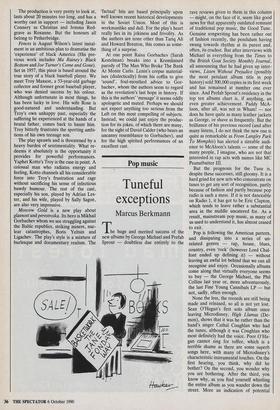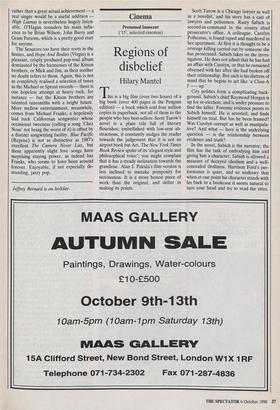Pop music
Tuneful exceptions
Marcus Berkmann
he huge and merited success of the new albums by George Michael and Prefab Sprout doubtless due entirely to the rave reviews given to them in this column — might, on the face of it, seem like good news for that apparently outdated remnant of traditional pop music, the Good Tune. Genuine songwriting has been rather out of fashion recently, the pendulum having swung towards rhythm at its purest and, often, its crudest. But after interviews with Michael in everything from the Times to the British Goat Society Monthly Journal, all announcing that he had given up inter- views, Listen Without Prejudice (possibly the most petulant album title in pop history) sold 300,000 copies in its first week and has remained at number one ever since. And Prefab Sprout's residency in the top ten albums chart is, if anything, an even greater achievement. Paddy McA- loon, after all, was not in Wham! — nor does he have quite as many leather jackets as George, or shave as frequently. But the brilliance of his previous record (and after many listens, I do not think the new one is quite as remarkable as From Langley Park To Memphis) has alerted a sizeable audi- ence to McAloon's talents — some of the many people, I imagine, who are not that interested in rap acts with names like MC Peanutbutter III.
But the prognosis for the Tune is, despite these successes, still gloomy. It is a hard grind for new acts who concentrate on tunes to get any sort of recognition, partly because of fashion and partly because pop radio is such a mess. If it is not danceable on Radio 1, it has got to be Eric Clapton, which tends to leave rather a substantial area in the middle uncatered for. As a result, mainstream pop music, as many of us used to understand it, has almost ceased to exit.
Pop is following the American pattern, and dissipating into a series of un- related genres — rap, house, blues, country, even 'rock' (however Lord Chal- font ended up defining it) — without leaving an awful lot behind that we can all recognise and enjoy. Occasionally albums come along that virtually everyone seems to buy — the George Michael, the Phil Collins last year or, more adventurously, the last Fine Young Cannibals LP — but not, sadly, often enough.
None the less, the records are still being made and released, so all is not yet lost. Sean O'Hagan's first solo album since leaving Microdisney, High Llamas (De- mon), shows that it was he rather than the band's singer Cathal Coughlan who had the tunes, although it was Coughlan who most definitely had the voice. Poor O'Ha- gan cannot sing for toffee, which is a terrible shame as there are some superb songs here, with many of Microdisney's characteristic instrumental touches. On the first hearing, you think, why did he bother? On the second, you wonder why you are bothering. After the third, you know why, as you find yourself whistling the entire album as you wander down the street. More an indication of potential rather than a great actual achievement — a real singer would be a useful addition — High Llamas is nevertheless hugely listen- able. O'Hagan considers his main influ- ence to be Brian Wilson, John Barry and Gram Parsons, which is a pretty good start for anyone. The Senators too have their roots in the Sixties, and Hope And Bodies (Virgin) is a pleasant, crisply produced pop-soul album dominated by the harmonies of the Kitson brothers, or Mick and Jim, as their mother no doubt refers to them. Again, this is not as completely realised a selection of tunes as the Michael or Sprout records — there is one hopeless attempt at heavy rock, for instance — but the Kitson brothers are talented tunesmiths with a bright future. More mellow entertainment, meanwhile, comes from Michael Franks, a hopelessly laid back Californian songwriter whose occasional tweeness (calling a song 'Chez Nous' not being the worst of it) is offset by a distinct songwriting facility. Blue Pacific (Reprise) is not as distinctive as 1987's excellent The Camera Never Lies, but these apparently slight love songs have surprising staying power, as indeed has Franks, who seems to have been around forever. Enjoyable, if not especially de- manding, jazzy pop.



















































 Previous page
Previous page